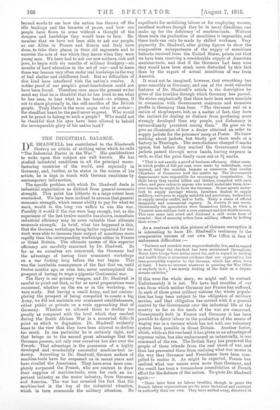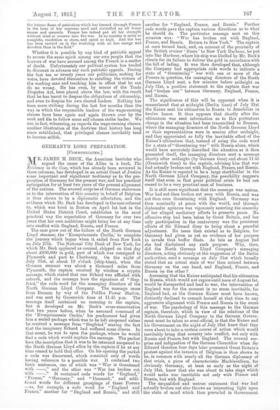THE INDUSTRIAL BALANCE. D R. SHADWELL has contributed to the Nineteenth
Century an article of striking value which he calls "The Industrial Factor in the War. " His qualifications to write upon this subject are well known. He has studied industrial conditions in all the principal manu- facturing countries of the world, and especially in Germany, and, further, as he states in the course of his article, he is kept in touch with German conditions by contemporary information. The specific problem with which Dr. Shadwell deals is industrial organization as distinct from general economic strength. This point has hitherto to a large extent been overlooked. We have been inclined to assume that general economic strength, which means ability to pay for what we want, would in the long run suffice to win the war. Possibly it would if the run were long enough, but, as the experience of the last twelve months has shown, immediate industrial efficiency may be more valuable than ultimate economic strength. In brief, what has happened is this, that the German workshops being better organized for war work were able to increase their output of munitions more rapidly than the corresponding workshops either in France or Great Britain. The ultimate causes of this superior efficiency are carefully examined by Dr. Shadwell. So far as we ourselves are concerned, the Germans had the advantage of having their armament -workshops on a war footing long before the war began. This was the inevitable consequence of the fact that we, until twelve mouths ago, or even less, never contemplated the prospect of having to wage a gigantic Continental war. The Navy is our primary weapon, and Dr. Shadwell is careful to point out that, so far as naval preparations were concerned, whether on the sea or in the workshop, we were ready. But having a small Army, and not contem- plating the prospect of being compelled to create a big Army, we did not maintain our armament establishments, either public or private, on a scale approaching that of Germany. Whether we allowed them to decline too greatly as compared with the level which they reached during the South African War is 'a somewhat difficult point on which to dogmatize. Dr. Shadwell evidently leans to the view that they have been allowed to decline too much. In one particular he is certainly right, and that brings us to the second great advantage that the Germans possess, not only over ourselves but also over the French. That advantage is the possession of a highly developed and wondertully successful machine-tool in- dustry. According to Dr. Shadwell, German makers of machine-tools have far surpassed us in recent years and have rivalled the Americans. They have even more com- pletely surpassed the French, who are content to draw their supplies of machine-tools, even for such an im- portant industry as the motor industry, from Germany and America. The war has revealed the fact that the machine-tool is the key of the industrial situation, which in turn commands the military situation, No expedients for mobilizing labour or for employing women, excellent 'workers though they be in many directions, can make up for the deficiency of machine-tools. Without these tools the production of munitions is impossible, and these tools can only be made by skilled workmen. Very piquantly Dr. Shadwell, after giving figures to show the comparative unimportance of the supply of munitions hitherto received from the United States, points out that we have been receiving a considerable supply of American machine-tools, and that if the Germans Lad been wise they would have been much more disturbed by this fact than by the export of actual munitions of war from America.
It must not be imagined, however, that everything has gone smoothly in Germany, and one of the most valuable features of Dr. Shadwell's article is the description he gives of the troubles through which Germany has passed. He states emphatically that there have been more scandals in counexion with Government contracts and excessive profits in Germany than here. "The Germans call us a. nation of shopkeepers, but, as a matter of fact, they have the instinct for dealing as distinct from producing more strongly developed than any people, and dishonesty is extraordinarily prevalent among them." He goes on to give an illustration of how a dealer obtained an order to supply jackets for the prisoners' camp at Posen. He know nothing about jackets, but finally got them made at a factory in Thuringia. The manufacturer charged 6 marks apiece, but before they reached. the Government these jackets passed through seven hands, leaving sixpence in each, 'so that the price finally came out at 9i marks.
" That is not exactly a proof of business efficiency. Other cases, in which profits of 500 per cent. were made by individuals, were exposed, and the scandals became so numerous that sundry Chambers of Commerce took the matter up. The 'Government departments were responsible for encouraging irregularities. In their hurry they rushed hither and thither, competed with each other, and gave orders to anyone who would undertake them, how- ever remote he might be from the business. House agents under- took to supply carriage wheels., furniture dealers to supply saddlery, surveyors to supply sailcloth and provisions, booksellers to supply cavalry outfits, and so forth. Truly a chaos of official incapacity and commercial roguery. In Austria it was worse. Occasionally the speculators were themselves bitten, as when a Viennese man-milliner took a corn contract and lost 80,000 crowns. This case came into court and disclosed a still worse form of scandal that of securing orders from military officers by bribing their wives."
As a contrast with this picture of German corruption it is interesting to have Dr. Shadwell's testimony to the comparative success of our own War Office in face of unforeseen difficulties :— " Failures and scandals were unprecedentedly few, and in regard to most things the standard has been maintained throughout. Never have troops been better cared for, and in regard to feeding and health there is abundant evidence that our organisation has been perceptibly superior to the German, which has often been at fault. I have no interest whatever in praising the War Office or anybody in it; I am merely looking at the facts as a dispas- sionate outsider."
If this were the whole story„ we might well be content. Unfortunately it is not. We have had troubles of our own from which neither Germany nor France has suffered, In each of these great military nations the whole popula- tion has bang been subject to the obligation of military service, and that obligation has carried with it a general control by the Government over the industrial life of the country so far as the needs of the war are concerned. Consequently both in France and Germany it has been possible to direct labour to the production of the means of waging war in a manner which has not with our voluntary system been possible in Great Britain. Another factor, which, while on the one hand it has given us an advantage of supreme value, has also embarrassed us industrially, is our command of the sea. The British Navy has preserved the people of these islands from the real shock of war, and thus has prevented them from realizing what war means in the way that Germans and Frenchmen have been com- pelled to realize it. As might be expected, France has realized what war means even more than Germany, and the result has been a tremendous consolidation of French effort for the defence of the nation. To quote Dr. Shadwell again :— " There have boon no labour troubles, though in peace the French labour organizations are far more turbulent and resistant to authority than our own. They have melted away, dissolved in
the intense flame of patriotism which has burned through France he the hour of her supreme need and shrivelled up all lesser Causes and quarrels. France has indeed put all her strength without stint or reserve into the war. In no country is unity so complete, resolution so stern, and spirit to high. And the war has been carried on in the workshop with no less energy and devotion than in the field." .
Whether it is possible by any kind of patriotic appeal to arouse the same spirit among our own people that the horrors of war have aroused among the French is a matter of doubt. Unfortunately our political system has tended to discount in advance any such patriotic appeals. During the last ten or twenty years our politicians, seeking for votes, have devoted themselves to extolling the virtues of the working man and teaching him in effect that he can do no wrong. He has even, by means of the Trade Disputes Act, been placed above the law, with the result that he has learnt to despise the obligations of citizenship, and even to despise his own elected leaders. Nothing has been more striking during the last few months than the way in which the responsible leaders of the wage-earning classes have been again and again thrown over by the rank and file to follow some self-chosen strike leader. We are, in fact, witnessing, as regards the wage-earning classes, another illustration of the doctrine that history has long since established, that privileged classes inevitably tend to become selfish.



































 Previous page
Previous page